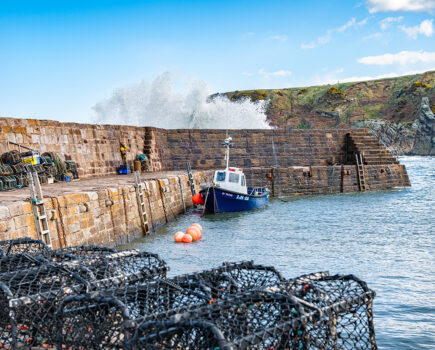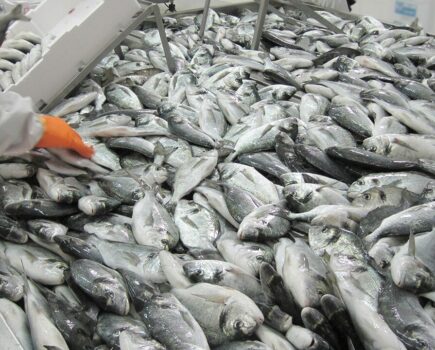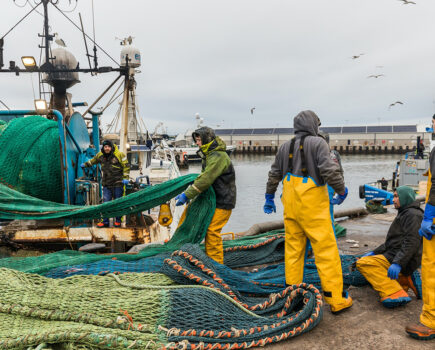In his annual message, David Milne, Chairman of the Scottish White Fish Producers’ Association (SWFPA) for five years, has told members that this is the most bizarre of times, with a surreal set of circumstances. On the one hand, the industry is witnessing a real benefit from the recent upsurge in stock abundance and increases in a number of our commercially important stocks. Frustratingly, and in complete contrast, the sector is spending an inordinate amount of time working out how to adapt to an ill-fitting piece of legislation called the Landing Obligation; a change in policy that has the potential to create havoc with our industry.
Mr Milne told his members that the SWFPA continues to thrive, with vessel numbers only marginally down on the same point last year. He said that from the comments he receives, it was clear that the Association commands a great deal of respect, both in terms of how it goes about its business and the quality of the work it produces, as well as its willingness to participate in the most difficult of issues. The SWFPA continues to be seen as the foremost Association within the UK seafood sector, and as Chairman, he can ask for no more.
As the sector enters a period of greater environmental awareness and societal demands, our exposure to public scrutiny has scaled new heights. As an industry, we get frustrated with the range of external factors now involved in the business of fishing. Nevertheless, David Milne said, he has instructed his team to be very aware of that threat and to deal with it accordingly.
The SWFPA continues to remain active on a wide range of fronts, both overseas and at home. Its focus overseas is split between the impact of the landing obligation, and working with others to ensure its phased introduction, as well as ensuring that any new deep-sea regulation doesn’t impact our traditional, non-deep-sea fisheries, such as that for saithe and monkfish. Other international issues include the new technical conservation regulation, where SWFPA has lobbied hard to ensure it is fit-for-purpose, and the yet-to-be constructed multi-annual, mixed-fisheries plans which, if not well constructed, will promote reduced levels of opportunities.
At home, the Association is very much focused on shaping the introduction of a coherent network of MPAs, and fending the unwelcome elements of instruments such as regulating orders, that are being proposed by well-funded non-fishing organisations without the support of the fishing industry.
The Association is very aware of the need for clear lines of communication with its members; it is very important that they continue to be informed to the greatest possible extent, which is why the Association has tailored its systems so that members receive only the information that relates to their particular business.
The Association has renewed its focus, and is now combatting some of the negative stories that appear in the media. In conjunction with the Shetland Fishermen’s Association, SWFPA has embarked on a positive news campaign. Some of these articles have proved invaluable in combatting some of the very negative and misleading press, especially on scallop and other inshore issues.
In 2015 the Association joined with others to host a seafood stand at the Fishing Exhibition; the intention is to replicate that event in 2016, and to expand the number of public-facing events in the coming year. The Association and its members were delighted to supply the seafood for the recent Seafish ‘Fish and Chip Shop of the Year’ awards.
Like other trade protection organisations, the SWFPA continues to evaluate its performance and, while in many ways that can be difficult, David Milne is convinced that it can continue to perform to a very high standard. An element of its internal structure that differs from most, is the ability to discuss sector-specific issues within its committee structure. The ability of the SWFPA to take strong policy positions through a democratic process is very much in its favour, when lobbying governments, institutions and representatives of civic society.
The Association is going from strength to strength at a time when solid, well-argued and stated positions and opposition is in greatest demand. David Milne said that he had instructed both Mike Park (CEO) and Anne-Margaret Anderson (Inshore & Environmental Policy Co-ordinator) to continue to build relationships with key players, which he viewed as critically important when focused on delivering a stable and thriving industry.
The Association is very fortunate to have such a committed, small team, delivering at the sharp end of fishing politics; very few operate at the same high level. David Milne took the opportunity to thank Mike Park and Anne-Margaret Anderson for their continuing focus, hard work and endeavour, saying it is very much appreciated.
Read more from Fishing News here.







